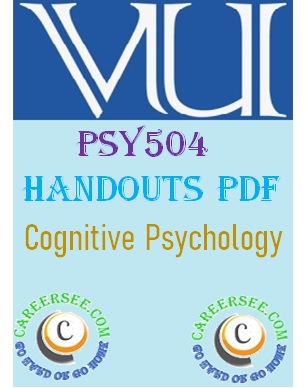Table of Contents
PSY504: Cognitive Psychology Handouts (PDF )
Cognitive psychology is the science of how we think. It pertains to our inner thinking processes such as attention, perception, memory, action planning, and language. Each of these components is crucial in shaping who we are and how we behave. PSY504 Handouts pdf
PSY504 Handouts pdf
Course Category: Psychology PSY504 Handouts pdf
Course Outline
Introduction to Cognitive Psychology, The information processing approach, Cognitive neuro-psychology Information processing in visual cells, Visual sensory memory experiments (continued), Attention, Capacity models, Multimode theory, Automaticity, Automaticity ( judging frequency ), Pattern recognition, Feature analysis, Voice-onset time, Gestalt theory of perception, Object perception, Attention & pattern recognition, Neural networks, Effects of sentence context, Short term working memory, Working memory: an activation model Chunking, The nature of forgetting, Atkinson & Shiffrin model, Long term memory, Interference, Recall versus recognition, Long term memory (forgotten memories), Representation of knowledge, Levels of categories, Schema theory, Psychological reality of scripts Applications for studying, Study methods, Mental imagery, Eidetic imagery, Language and thought, Cognitive development, PSY504 Handouts pdf
Join VU assignment solution groups and also share with friends. We send solution files, VU handouts, VU past papers, and links to you in these WhatsApp groups. To join WhatsApp groups click the below links.
ALSO, SEE:
Jazz Internet Packages | Daily, Weekly, and Monthly and 3 Day Jazz
Zong free internet code 2022 | Get Free internet 3G/4G
TELENOR FREE INTERNET PACKAGES
MUST JOIN VU STUDY GROUPS

PSY504 HANDOUTS
PSY504: Cognitive Psychology
Cognitive Psychology
Cognitive Psychology is about understanding. Knowledge can be understood as “thinking” or “knowing. ”We can say, in other words, that cognitive psychology deals with the processes involved in thinking, acquiring, and retaining information. For this purpose, it uses a data processing method.
Historical Background
Plato, a prominent Greek philosopher, was the first to introduce a coherent notion as to how information is acquired and stored. He suggested that ideas be created in the human mind and that these ideas be reflected in the world. These predictions act as signals that we see through our senses. In other words, the outside world is an illusion built on speculation and real truth within us. Therefore, Plato concluded that vision is an internal process and that we can learn everything by looking inside.
Cognitive Neuropsychology
Cognitive Neuropsychology defines the level of hardware to use a computer metaphor. The neural architecture of cognition is the foundation on which a software-level structure is built.
At this level, it is possible to describe many visual and audible objects. However, high-level recognition remains a mystery.
Neuropsychological Methods:
Brain-injured Humans
Research on brain damage has greatly enriched our understanding of human understanding. It has allowed psychologists to design differentiated brain tests that have made us aware of the differences between the right and left hemispheres of the brain. PSY504 Handouts download pdf
Brains of Dead People
Testing the brains of dead people has also added to the understanding of comprehension but to a limited extent. The brains of people with certain brain disorders were examined to see if there were any traces of the disease that could illuminate our normal brain function.
Neuro-imaging
X-rays have also contributed to our understanding of brain processes. But what has been more revealing has been Magnetic Resonance Imaging (MRI) and functional MRI (fMRI) scans. The MRI process is complex and produces limited information. FMRI, however, allows live brain scanning and is less disruptive, and has no radiation. But it still remains an understanding of the hardware level of the brain and will never change the definition of a software level.
Animal Studies
A really controversial way to learn neural processes is to study living animals. This method is controversial because these animals undergo brain surgery where parts of the brain are removed to see how they will work. The conditions under which these animals are kept have also been questioned. Undoubtedly, much useful information has been acquired through animal studies, but ethical issues remain.
Neuron
There are 70 billion neurons in the brain. A neuron is a special cell that transmits and stores information of various kinds. The cell body contains the nucleus in its center that controls neuron functions. There are tiny branches connected to the cell body called dendrites that transmit information to neurons from other neurons. A neuron, on the other hand, has a branch called an axon that transmits information from neurons to muscles.


